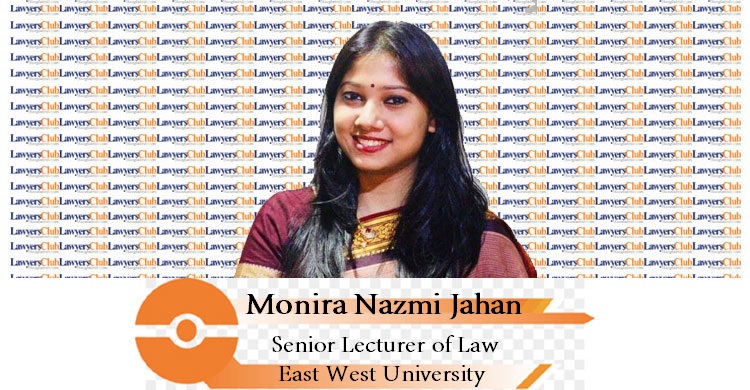Terrorist Radicalization: Difficult to Detect

MoniraNazmi Jahan:
It has been four years since Bangladesh has faced the deadliest terrorist attack in Holey Artisan Bakery. People still have goosebumps when they recall the memory of that horrific terrorist attack. Since independence, Bangladesh has practicing secularism, and harmonization among different cultures of people is a familiar picture. We celebrate every single religious and cultural occasions with full of heart and love. Foreigners are always welcomed with gratitude, and the country was undoubtedly secure for foreigners. One dreadful terrorist attack and the whole country was wholly shaken. A group of five men killed twenty-two people, and most of them were foreigners.
Thankfully, in 2019 the Anti-Terrorism tribunal delivered a judgment against seven members of the new Jamaat-ul-Mujahideen Bangladesh for killing twenty-two innocent victims. The tribunal has sentenced seven terrorists to the death penalty based on their different degrees of involvement in the attack. The Islamic extremists want to attract the ISIS to be an affiliate member of it and to create Islamic rule throughout the country. Even after hearing the death sentence, they were not repentant; instead, they said it was divinely commanded from Allah.
After the incident, several questions pop up in the mind of the people. The first one is why these young bunch of people are becoming terrorists? Then, what factors motivate them to kill their innocent fellow human beings? Before this incident, a blocked concept captivated people’s minds that only Madrasa students and poor people are quickly radicalized. However, the illusion busted when people realized that any educated youth,even from an affluent family, could also be radicalized. In reality, a terrorist may come from every sphere of life, for example, from a low-income person like Abu Musab al-Zarqawi to a wealthy one like Osama Bin Laden.
On the one hand, there is a high school dropout with a criminal record like Richard Reid, popularly known as ‘shoe bomber,’who tried to blow out the American Airlines Flight in December 2001. On the other hand, there is Ahmed Saeed Sheikh, a brilliant person who left the London School of Economics and joined Al-Qaeda. It was Ahmed who kidnapped the Wall Street Journal reporter Daniel Pearl and then brutally beheaded him. Similarly, Nidal Malik Hassan, a U.S. Army psychiatrist stationed at Fort Hood, Texas, influenced by jihadist beliefs. After that, he conducted a mass shooting in 2009, and killed 13 individuals and wounded thirty people. Hence, irrespective of the level of education, economic condition, and social structure, terrorist organizations like Al-Qaeda, ISIS recruit people.
Well, honestly speaking, there is no single recipe or method that can describe how and why people are becoming terrorists. It is absolutely a personal decision to join a terrorist organization and to conduct terrorist activities. However, frustration, grievance, sense of dishonor, religious obligation, and desire to change socio-economic and political conditions of society can motivate people to adopt the path of terrorism. People get influenced by observing what their friends, peer group, and social groups are doing. Therefore, people can be recruited from educational institutions, from recreational and religious places, from sports activities and, of course, from the internet. Yes, it is easy to radicalize a person who shares the same anger and frustration similar to the terrorists to change whatever the wrong they are facing in their societal system. Rightfully stated by Edwin Hardin Sutherland, an American Sociologist in his ‘Differential Association Theory,’ that criminal behavior is learned.
Moreover, this behavior is learned through communication, and it is easy to learn from intimate personal groups like friends, family, and peers. Suitable examples are the five men who conducted the terrifying attack on holey artisan bakery. Most of them were radicalized by their friends and peer groups.
Furthermore, according to Sociologist Robert Agnew’s ‘General Strain Theory,’ Criminal behavior is related to anger and frustration. Those components influence a person to commit a crime when an individual is treated in a way he or she does not want to be treated in a social relationship. ‘Social Learning Theory’ also plays a vital role in the case of explaining extremist radicalization. Observing people and considering someone as a role model can also inspire a person to join a terrorist group. Interestingly, terrorists commit violence to grab the mass people’s attention and send their message to the broader audience of how powerful they are. That is why they are always up to doing something which can give them massive media attention. In the case of lone wolves, they observe and follow the terrorists via the internet, adopt their ideology and learn the tactics of terrorism. Finally, they commit some unexpected terrorist attacks. One excellent example is “Boston Marathon Bombing,” on April 15, 2013; two pressure-cooker bombs exploded near the Boston Marathon’s finish line, killing three and injuring 264. The bombing was perpetrated by a pair of Chechen brothers named Tamerlan Tsarnaev and Dzhokhar Tsarnaev, motivated by extremist Islamist beliefs but were not connected to any terrorist group. Lone wolves are terrifying and dangerous, as they are very hard to detect and stop.
Hence, it is tough to say who is going to be radicalized based on what ground. Despite that, family and educational institutions should be more cautious about detecting any changes in any youth. Undoubtedly our law enforcement agencies did a tremendous job of mitigating terrorism activities in Bangladesh. Religious preachers should be delivered appropriately by not humiliating any religion and not spreading any hate speeches. Sacred books should be taught with proper meaning and guidelines. As Bangladesh is a land full of people with diverse cultures and religions, these extremists, by no means, get a chance to infringe our security and peace by conducting terrorist activities.
MoniraNazmi Jahan: Senior Lecturer; Department of Law, East West University, Bangladesh

